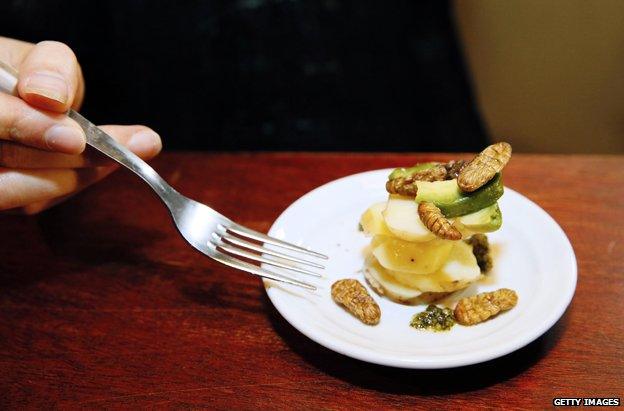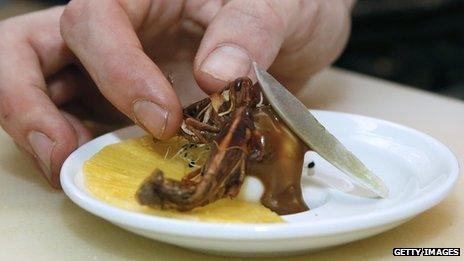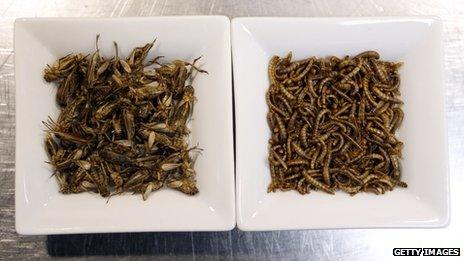Insect eating creeps on to Paris menus
- Published

Scorpions and grasshoppers can now be found on the menus of upscale French restaurants, just as those concerned about the world's increasing demand for protein are looking to insects as one solution.
Of course, the French would use a fancy word - entomophagy - when it's insect-eating to you and me.
For millennia it's been the preserve of peasant peoples in many parts of the world. But today it's beginning to make in-roads in the self-proclaimed capital of haute cuisine.
In Nice, Michelin-starred chef David Faure offers an "Alternative Food" menu at his Aphrodite restaurant. Mealworm and crickets share the billing with pate de foie gras.
And now in the hip Montmartre neighbourhood of Paris, Le Festin Nu (The Naked Lunch) bistro gives customers the chance to select from a variety of entomological treats.
To accompany your glass of vin naturel (organic wine), you can try palm weevils with beetroot and oil of truffle; water scorpion with preserved peppers and black garlic; or grasshopper with quail's eggs.
Chef Elie Daviron, 26, wants to give a culinary helping-hand to a cause he holds dear.
"It's my unusual background which got me interested. I'm a trained chef, but my studies were in political science and sociology.
Elie Daviron: "It's an interesting puzzle - how can I get people to eat insects?"
"So on the one hand there's the whole question of finding new sources of food to feed the world. And on the other there's the challenge of making it look and taste good."
Daviron likes to quote from the great French anthropologist Claude Levi-Strauss, who drew a distinction between "sarcophagy" and "zoophagy".
Societies that indulge in sarcophagy, or flesh-eating, tend to disguise the origin of their meat. The classic example is the English meat-pie - where the flesh is hidden beneath a layer of pastry.
Zoophagists (animal-eaters), by contrast, relish the act of eating real, identifiable beasts.
Daviron is very much the zoophagist.
"We could go two ways with insect-eating. The agro-industry would just churn them into protein flour. I want to keep the notion that the insects are real, whole animals."
His five varieties (the other two are silk-worms and water scorpions) are imported freeze-dried from Thailand.
This limits his possibilities for cooking, so his work is mainly in arranging combinations of textures, tastes and colours.
The snacks sell for eight to 10 euros - so they are not cheap. Most customers come for the novelty value, and as the alcohol flows the orders tend to multiply.
"A few people say they find the whole thing disgusting so don't even try. A few try and don't like. But generally speaking, the only disappointment people have is that there isn't more on offer," says Daviron.

"Fly in my soup" jokes could make a comeback
It is no coincidence that the scientific side of insect-eating is the subject of growing interest in Europe.
Research programmes are underway in France and the Netherlands, and a number of start-ups are developing methods of small-scale insect-farming.
A report this year , externalfrom the UN's Food and Agriculture Organisation (FAO) was seen as a call to action.
With the world's population heading to nine billion, the FAO said that demand for animal protein is set to double by 2050, and it listed 1,900 species of insects that might be called upon to fill the gap.
According to the FAO, "micro-livestock" can offer the same protein and mineral content as regular meat or fish - but at far less cost.
While eight kilograms of feed are required to produce a kilogram of beef, it takes only two kilograms to get the same amount of edible insect.
Insects could also be useful for providing fodder for conventional livestock. One of the French research programmes is aimed at using ground-up mealworm and soldier ants for fish- and chicken-feed.
The trouble is that, so far, large-scale insect-farming has proved technologically and financially impossible.

Cricket and worms are served side by side at Aphrodite
"No-one has yet been able to produce insects on an industrial scale," said Jean-Gabriel Levon, who runs Ynsect - a small business involved in the research programme. "We need to improve our understanding of the physiology of insects and their needs."
Another difficulty is the legal void. In theory the EU's Food Safety Authority (EFSA) is supposed to issue market authorisation for new foodstuffs, but none has been given.
"Commercialising insects for human consumption is not authorised but tolerated," said an official at the French agriculture ministry.
Back at Le Festin Nu, the evening is getting late and an old Africa hand called Georges Yang is waxing lyrical. He is adept at l'entomophagie.
"You know I get quite annoyed when people say insects will help the world's poor," he says.
"The implication is that they are miserable people so they deserve miserable food.
"But it's pejorative. If you prepare them properly, insects are excellent food."
So saying, Georges helps himself to another mouthful of grasshopper. With quail's eggs.
Follow @BBCNewsMagazine, external on Twitter and on Facebook, external